Brian Simmons was interviewed by Sid Roth for an edition of ‘It’s Supernatural’ broadcast on 2 February 2015. At 20.20-59 Simmons says that whereas ‘in the bibles of many men’ Ephesians 5.22 reads:
‘Wives submit yourselves unto your husband as unto the Lord.’
the Aramaic text (still according to Simmons) is:
‘Wives be tenderly devoted to your husband as the church is tenderly devoted to Christ.’
As Roth observed, this is a ‘big difference’:
This claim attracted my attention, and so I endeavoured, despite myself not knowing Syriac (the form of Aramaic that is used in the Peshitta), to test it.
Ephesians 5.22
First of all, the Passion Translation (so-called) does indeed have the first part of Ephesians 5.22 rather as Brian Simmons gave it on the Sid Roth show, with ‘tenderly devoted to’ rather than ‘submit’. Here it is as it appears in the Kindle Edition of ‘Letters From Heaven by the Apostle Paul (The Passion Translation)’:
The Greek text reads:
[21] ὑποτασσόμενοι ἀλλήλοις ἐν φόβῳ Χριστοῦ [22] αἱ γυναῖκες τοῖς ἰδίοις ἀνδράσιν ὡς τῷ κυρίῳ, [NA 28]
The verb for verse 22 is supplied from verse 21 and is the participle ὑποτασσόμενοι from ὑποτάσσω, which as Simmons rightly says, means in the middle/passive voice as here ‘to submit oneself’ or ‘be subject’. Normal English translations include:
Wives, submit to your own husbands, as to the Lord. [ESV]
Wives, be subject to your own husbands, as to the Lord. [NASB]
Simmons says he is translating from the Aramaic rather than the Greek. As in my previous posts, I leave aside the question of why he would prefer to do that, when it must surely be certain that Paul would have been writing in Greek to the Ephesians. My purpose here is simply to ascertain whether Simmons really has translated this verse from the Aramaic as he claims. He makes explicit in his FAQs that he is claiming to work from ‘the original Hebrew, Greek and Aramaic documents’, and not from English translations of these:
English translations
The Peshitta tool gives three English translations from the Peshitta text, which is the Aramaic version that Simmons says in his FAQs he is ’employing insights’ from. Etheridge’s is in green, Murdock’s in navy, and Lamsa’s in purple:
A new translation by James E. Walters was published in 2013 by Gorgias Press. The chapter is here, and Ephesians 5.22 reads:
Thus all four translations have ‘our Lord’ instead of ‘the Lord’, but are otherwise along the same lines as the translations from the Greek. How then does Simmons derive ‘be tenderly devoted to’ from the Peshitta text?
Checking the text
First of all, we may compare the two forms of the Syriac text that are available at dukhrana.com, just to check that there are no differences in manuscripts that might explain Simmons’ translation. Like Hebrew, which has the same consonants as Syriac, they are to be read from right to left.
BFBS/UBS
Khabouris:
It can be seen that the two forms of the text are identical in this verse.
The meaning of ܡܶܫܬ݁ܰܥܒ݁ܕ݂ܳܢ
Here is the verse again, with Western vowel signs and transliteration:
ܢܶܫܶܐ ܗܘܰܝܬ݁ܶܝܢ ܡܶܫܬ݁ܰܥܒ݁ܕ݂ܳܢ ܠܒ݂ܰܥܠܰܝܟ݁ܶܝܢ ܐܰܝܟ݂ ܕ݁ܰܠܡܳܪܰܢ
(nešše həwaytēn meštaᶜbəḏān ləḇaᶜlaykēn ᵓayḵ dalmāran)
The Dukhrana analysis tool shows that the word at issue is ܡܶܫܬ݁ܰܥܒ݁ܕ݂ܳܢ (meštaᶜbəḏān), and that it is in the Eshtaphal form:
I explained in an earlier post – and here I should perhaps repeat my disclaimer that I don’t know Syriac, I am only delving a little into standard grammars – that Syriac has six main verbal forms: pe’al, pa’el, and aph’el, and their three Eth-pattern counterparts, ethpe’el, ethpa’al, and ettaph’al. The Eshtaphal is not one of these six primary forms.
Muraoka at Section 49 has the same six forms, written slightly differently. He explains that the Eth forms can be used for the reflexive as well as for the passive:
I mention this because ὑποτασσόμενοι in Ephesians 5.21-2 can either be taken as a passive (‘be subjected’), or a middle, which can be translated into English in a reflexive way (‘submit yourselves’).
Muraoka goes on to describe further less common forms, including the Eshtafal (that is, the Eshtaphal, as he writes it), which is the Eth-pattern counterpart to the Shafel:
An ‘s’ with a caron on top, š, represents the ‘sh’ sound, hence (I think) ‘Eshtafal’. The word we are looking for is meštaᶜbəḏān. The initial mim (‘m’) signifies (I think) that this is a participle (Muraoka §51):
So, even before using the dictionary tools at dukhrana.com for the word, it is already looking like this word may be the same as one of the three mentioned by Muraoka: ša’bed, ‘to subjugate’.
The lexeme is ܥܒܕ (three consonants, ʿē-beth-dalath, where ʿē is similar to the Hebrew ע, ʿayin), and its primary meaning is ‘to do’, or ‘to act’, as shown by Jennings:
For the Shaphel form, ܫܥܒܕ (with first letter ܫ (shin), so shin-ʿē-beth-dalath) Jennings gives the meaning as ‘has subjected’. This is indeed the same word ša’bed that Muraoka listed among those that occur in the Shaphel form. In the Eshtaphel form, which is the one we are looking for, he gives the meaning as ‘was subjected’.
J. Payne Smith (Mrs Margoliouth) gives the meanings ‘enslave’, ‘bring into subjection’ and so on for the Shaphel form, and ‘to be enslaved’, ‘be subject’, ‘to submit’ and so on for the Eshtaphel:
Likewise the entry in her father’s Thesaurus Syriacus (col. 2772) gives the meanings ‘subjectus est’ (be subject), ‘in servitutem redactus est’ (be in a condition of slavery, servitude) for ܥܒܕ in the Eshtaphel form, and cites Ephesians 5.22 among the Testament examples of its use. It can be seen that it was sometimes used to translate δουλεύω (‘be a slave’, ‘be subjected’), ὑπακούω (‘to obey’), and πείθω (in James 3.3, where πείθω means ‘obey’), as well as ὑποτάσσω:
In the leading Syriac-English academic lexicon, Sokoloff’s 2009 Syriac Lexicon, the word is listed under ܫ (shin), in its shaphel form, here referred to as ‘Quad’ for quadriradical (so-called I think because the root has four consonants rather than the usual three). The passive and middle voice type of meanings are listed under ‘QuadRef.’, which signifies the quadriradical reflexive form, and is therefore equivalent here to the Eshtaphel form, which is the one we are looking for:
Sokoloff’s Lexicon is based on Brockelmann’s Syriac-Latin Lexicon Syriacum, and indeed for this word the citations are almost identical (p. 506):
In both Sokoloff and Brockelmann we do find one occurrence of the meaning ‘dedicate oneself’ (‘se dedit’), which may seem somewhat closer to the meaning ‘be tenderly devoted to’ which Simmons is claiming in Ephesians 5.22. But on the other hand:
- The idea of dedicating oneself to a heresy is still quite far from the idea of a godly devotion to another person.
- The reference is to an extra-biblical source, so provides weaker evidence for the use of the word in the Peshitta.
- In all the biblical references given in the Eshtaphel/QuadRef form, Brockelmann and Sokoloff give the meaning either under 1a, ‘submit oneself’ (‘se subjecit’), or 2. ‘to be subjugated, enslaved’ (‘subactus est’, ‘servivit’).
Finally, we turn to the Comprehensive Aramaic Lexicon, where the word is listed under its quadriradical Shaphel form šˁbd (ܫܥܒܕ), followed by the reflexive/passive Eshtaphel form, here called quad T:
The main meanings given are ‘to be enslaved’, ‘to be subservient’. ‘Worship’ is given as a further meaning, and it might perhaps be argued that this is not very far from Simmons’ ‘be devoted to’. But the same type of objections seem to apply as to the meaning ‘dedicate oneself’ considered above:
- The meaning at 2(a) of ‘to worship’ must be related to the idea of subservience. Simmons’ ‘be tenderly devoted to’, on the other hand, has a different connotation altogether.
- The citation is from an extra-biblical source.
- The CAL provides no evidence for this type of meaning in the Peshitta.
I conclude therefore that in Ephesians 5.22 there would be no justification for translating ܗܘܰܝܬ݁ܶܝܢ ܡܶܫܬ݁ܰܥܒ݁ܕ݂ܳܢ as ‘be tenderly devoted to’ rather than, say, ‘be subject to’, or ‘submit yourselves to’.
The mystery solved: enter Victor Alexander
From where then did Simmons derive his translation with ‘tenderly devoted to’ instead of ‘submit to’ or ‘be subject to’? The answer came from Brian himself, who kindly answered my query about another verse in the Passion Translation (Galatians 3.1), where his claim that he had translated from the Aramaic did not appear to stand up.
Curiously, Alexander’s translation of Galatians 3.1 has nothing about Jesus being revealed as the Manifestation of Wisdom, as Simmons has it, so that mystery remains unsolved. But look now at Alexander’s translation (so-called) of Ephesians 5.22:
(By way of explanation, ‘Maryah’ is Alexander’s transliteration of the Aramaic word ܡܪܝܐ (consonants: mim-resh-yodh-alaf) ‘Mar-ya’, which is used in the Peshitta to translate the tetragrammaton יהוה (YHWH), and occasionally of Jesus Christ in the New Testament, as for example in Acts 10.36 (‘He is LORD of all’ or ‘He is Lord of all’). Here, however, the word appears to be ܡܪܐ (consonants: mim-resh-alaf), ‘Mara’, meaning ‘Lord’ or ‘master’, so there does not seem to be any justification for Alexander using ‘Maryah’.)
What is of direct interest here is Alexander’s rendering ‘be devoted to’. I have discovered in the last week that in many cases where Simmons claims to have translated from the Aramaic text, but where his version seems to have little or no relation to that text, his source is in fact Alexander. So I have no doubt, in the absence of other explanations, that Alexander is the source here also. But from where does Alexander derive ‘be devoted to’?
So far as I have been able to ascertain so far, Victor Alexander claims to translate not from the Peshitta text known to scholars, but rather from what he calls the ‘Leeshana Supprayah’, or the ‘Sacred Scribal Language of the Scriptures’, which was used, according to Alexander, by both the Hebrew prophets and the apostles of ‘Eashoa Msheeka’ (Jesus Christ):
George Lamsa’s bible was translated from the Old Testament and New Testament Peshitta, so in claiming that his is the only bible translated from the ‘Leeshana Supprayah’, he seems to be differentiating this language from that of the Peshitta. Later on the same page, Alexander claims that Adam also spoke the same language:
Elsewhere, incidentally, he claims that all twelve apostles were fishermen, a claim that would seem to be contradicted by the fact that at least one of them was a tax collector (Matthew 9.9, Mark 2.14, Luke 5.27):
Alexander’s source documents
Alexander seems to imply that he does have a physical manuscript (or manuscripts) from which he is translating, but on the other hand he displays an unwillingness to present it for examination, or even to explain what it is or where it came from:
A few weeks before, similarly, he had referred to ‘the manuscript I am translating from’, but declined to say more about what it actually was:
Is the Holy Spirit feminine in nature?
Victor Alexander claims that in the ‘Ancient Aramaic language’ the Holy Spirit is feminine in gender, and that the Lord Jesus always refers to the Holy Spirit as ‘She’. This is, he claims, ‘an expression of the Holy Spirit’s nurturing quality and Her sacred, compassionate nature’:
I think Alexander is correct in saying that the Spirit in Old Syriac is feminine in gender. After describing a misconception in the Gospel of Philip that Mary could not have conceived of the Holy Spirit, since the Holy Spirit was female, the Syriac scholar Sebastian Brock points out (p. 250) that the word for ‘spirit’ is grammatically feminine in the Semitic languages as a whole:
The word ܪܘܚܐ (ruḥa) means ‘wind’ and ‘breath’ as well as ‘spirit’. Since there is no neuter in Syriac there would appear to be little significance in its being feminine in gender. It is then not too surprising if feminine forms appear with the word.
Consider, for example, Mark 4.31:
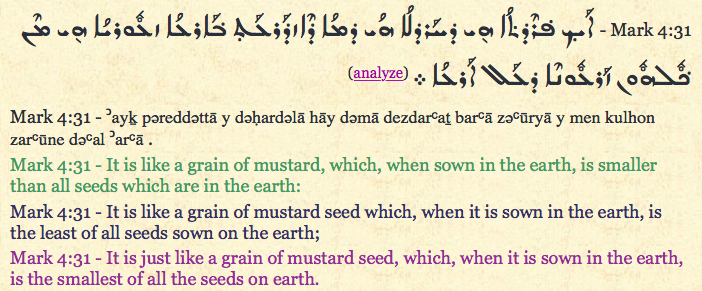 The Syriac words for ‘kingdom’, ܠܡܠܟܘܬܐ (verse 30), and ‘grain’, ܦܪܕܬܐ, are both feminine, and in consequence both the pronouns used to refer them in this verse are in the feminine form, ܗܝ. This does not mean that the kingdom of God is feminine and that grain is feminine. All three English translations have our neuter pronoun ‘it’, rather than ‘she’, as these are impersonal concepts.
The Syriac words for ‘kingdom’, ܠܡܠܟܘܬܐ (verse 30), and ‘grain’, ܦܪܕܬܐ, are both feminine, and in consequence both the pronouns used to refer them in this verse are in the feminine form, ܗܝ. This does not mean that the kingdom of God is feminine and that grain is feminine. All three English translations have our neuter pronoun ‘it’, rather than ‘she’, as these are impersonal concepts.
It is true that in the earliest Syriac manuscripts, the feminine pronoun is used at least once by Yeshua to refer to the Holy Spirit. Here is John 14.26 in the Peshitta (black) and the Sinaitic Palimpsest (purple):
Healey (p. 21) shows the difference between the masculine and feminine independent personal pronouns:
It can be seen that the Peshitta has the masculine form (‘hw’ in the transliteration) three times, and the Sinaitic Palimpsest has the feminine form (‘hy’) three times. It seems to me that the feminine form in the Palimpsest is probably best seen as a consequence of the grammatical gender of ruḥa, rather than as signifying femininity of the Holy Spirit. If a translation were to made of the Palimpsest it might perhaps be appropriate to use the English neuter ‘it’, as in the example from Mark 4.31 above.
Moreover, it does not appear to be the case, as Alexander claims, that the Lord Jesus always used the feminine pronoun to refer to the Holy Spirit. In John 15.26, the masculine pronoun is used to refer to the Paraclete, the Spirit of truth, in both the Peshitta (three times) and the Sinaitic Palimpsest (once, third from the end):
In my opinion, referring to the Holy Spirit as ‘She’, as Alexander does, is heretical. He seems to say (14 February 2014), if I understand him correctly, that when Jesus said to the beloved disciple ‘Behold your mother!’ (John 19.27), He was speaking about the Holy Spirit:
But it is clear from the previous verse that Jesus was actually referring to His mother Mary, who was standing there by the cross.
Film-making and Fellini
Victor Alexander is an independent film-maker, with a career in film-making starting soon after he graduated from San Francisco State University in 1970 with a B.A. in Film Production. His films seem to me to be marked by menace, violence, lust, magic and fantasy. For example, The Chase (2009) concerns a girl being stalked by two different men. Alexander describes it as a ‘psychological thriller about stalkers and the pray [sic].’ It seems to me to be designed to evoke fear. The Red Queen (2009) includes gratuitous nudity, as young people dance around a fire. Alexander says it is:
the story of a group of rockers, fire dancers and actors — all players in a magical game. It is a journey through uncharted territory, of dreams and reality. … This is my most felliniesque movie.
He says in his personal account that he wanted from the start to be a film-maker like Fellini, and this appears to be still his main influence in film-making. He wrote two years ago that he loves shooting in the style of Fellini:
On his YouTube channel, all his Favourited videos are of Fellini films, except for one of his own. In a casting call for ‘The Story of Jesus’, which was to be ‘a feature film based on the producer’s translation from the ancient Aramaic scriptures’, Alexander stated that ‘This will be a Fellini-esque movie’. Moreover, he has a web-site (felliniesque.com) promoting a type of film-making he calls Felliniesque, which is:
a style of filmmaking where dreams and reality are perceived as one experience.
On the same page, under the heading ‘Fantasy vs Reality’, he quotes Fellini as saying that the layer of ‘fantasies, dreams and imagination’ is ‘the real person’:
Again, he quotes Fellini as saying that ‘the truth is never clear’:
Fellini’s biographer Hollis Alpert describes him as having a ‘preoccupation with magic and the occult’, and as being ‘fascinated by and a good friend of Gustavo Rol, a magician from Turin’. According to Alpert, Fellini spoke of forces that could control the wind and rain, and believed Rol could ‘make these forces pass through himself like a medium, or channel’, and that Rol was ‘a man who had developed powers every one of us could have’:
I am not suggesting that Alexander has an interest in the occult, but I do think it is unwise at the least, and potentially dangerous, for a professing Christian to identify himself so strongly with a man who has such an interest.
The filming of The Red Queen
Alexander has given an account of the filming of footage for The Red Queen. They were driven to a ranch in the Sierra mountains where a private party was being held. There were ‘hundreds of acts’ with ‘fire eaters and fire dancers of every description’. He kept filming through the night. At dawn, Victor’s wife Liv, playing the Red Queen (who was a ‘Queen from a distant star’, according to the soundtrack’), saw a star which Alexander identifies as Venus, the so-called Morning Star. He says she spoke in tongues and said ‘in the Ancient Aramaic’ that:
‘It’s the star that the Father gave to Jesus, Eashoa Msheekha; it’s the Morning Star!’
I wonder about this. I believe in speaking in tongues, and believe that Christians can speak in human languages, as in Acts 2, and I can’t rule out speech in ancient languages, even if there is no biblical precedent for it to my knowledge. I don’t have a problem with God speaking through a Christian during a very ungodly event, and can see that it could possibly have a redemptive quality, conceivably in the way that Alexander portrays it in a short synopsis attached to a clip from the film:
But I do have two questions. We are not to despise prophecy, but we are to test it (1 Thessalonians 5.20-21). First, what does Alexander mean by ‘Ancient Aramaic’? Is he referring to a known language corresponding to an identifiable region and era, such as the Syriac of the Peshitta for example? And does he know this language well enough to be able to understand it when spoken?
Second, all things in heaven and on earth were given to the Lord Jesus (Matthew 28.18). So does it make sense to speak of a single star being given to Him? He is the Morning Star (Revelation 22.16), and will give the morning star to the one who overcomes and keeps His works until the end (Revelation 2.28). He has been given all the stars, so can we rightly speak of ‘the star’ which was given to Him?
Conclusions
Brian Simmons claimed on the Sid Roth show in 2015 that the Aramaic text of Ephesians 5.22 begins:
‘Wives be tenderly devoted to your husband…’
rather than:
‘Wives be subject to your own husbands…’ or:
‘Wives submit to your own husbands…’
Likewise in Simmons’ book Letters from Heaven he has the verse beginning:
‘For wives, this means being tenderly devoted to your husbands…’
with an endnote to say that this has been translated from the Aramaic.
I have I think shown that the case for translating ܡܶܫܬ݁ܰܥܒ݁ܕ݂ܳܢ with ‘be subject to’ or ‘submit to’ (or similar) is overwhelming. The primary meanings of ܥܒܕ in its Shaphel and Eshtaphal forms given in the lexicons relate to subjection and submission, and they show no significant deviation from this type of meaning in the biblical usage of the word in these forms.
I have explained that Simmons himself pointed me to Victor Alexander’s work as a source for his translations, and that Alexander has ‘be devoted to’ in Ephesians 5.22. I intend to demonstrate in a future post that where Simmons claims to have translated from the Aramaic, he has actually derived his rendering from Alexander’s work. So I think it almost certain that Alexander is the source here.
I have shown that Alexander claims to be translating from a manuscript written in a ‘Sacred Scribal Language of the Scriptures’, but has been unwilling to specify what this manuscript is. I have also shown that he promotes a style of ‘Felliniesque’ film-making where ‘dreams and reality are perceived as one experience’.
Putting these things together, I think there is a possibility that the manuscript that Alexander claims to be translating from does not actually exist. If this is true then it looks like Simmons’ rendering of Ephesians 5.22 has no basis in reality.
Andrew

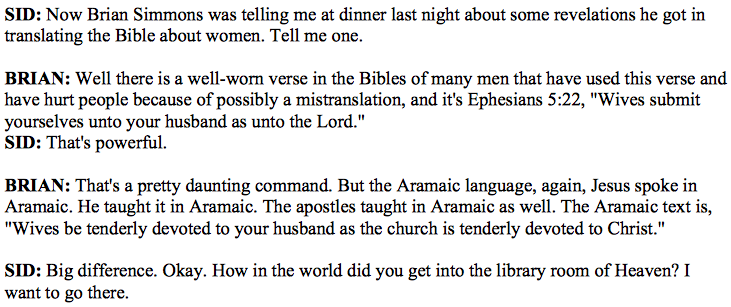





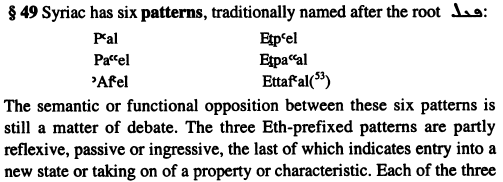


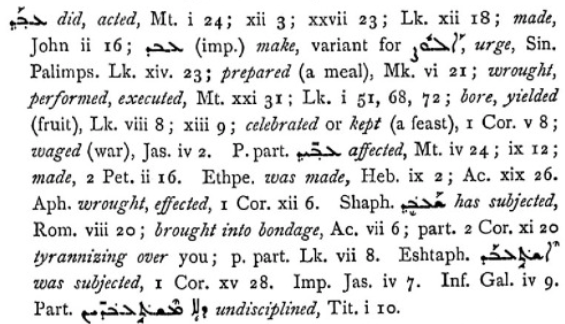

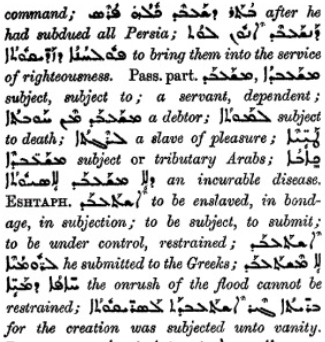
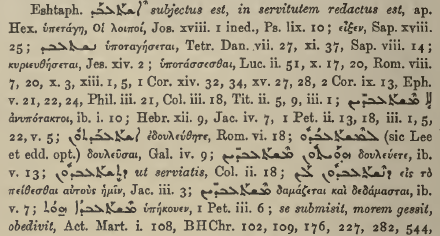
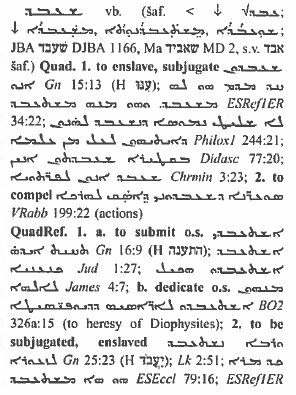
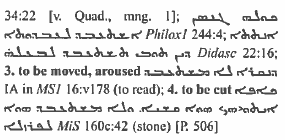
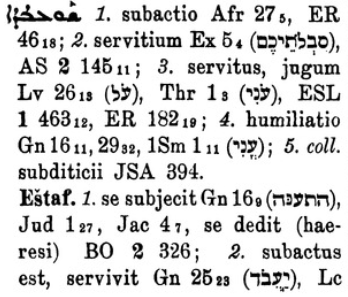

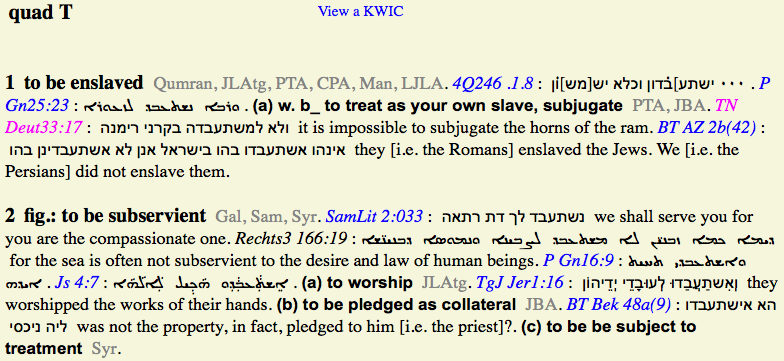





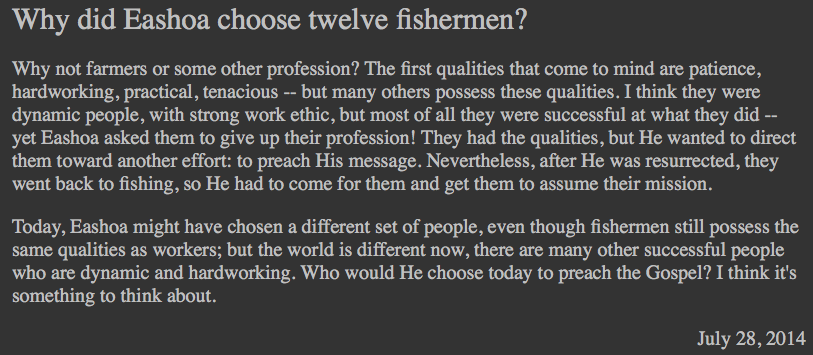

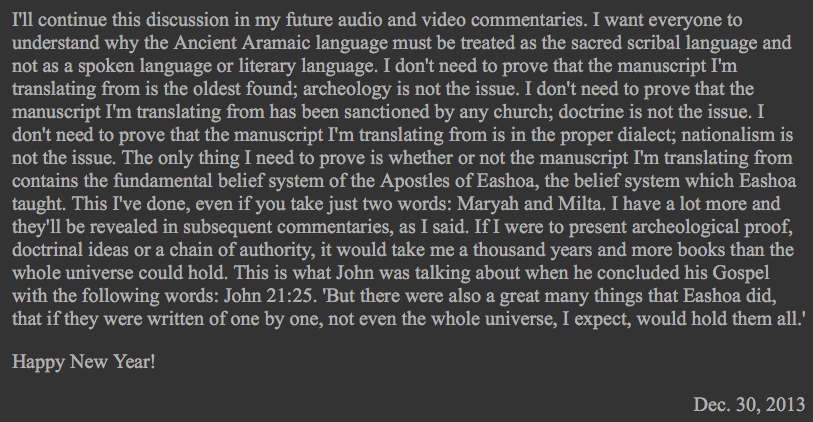


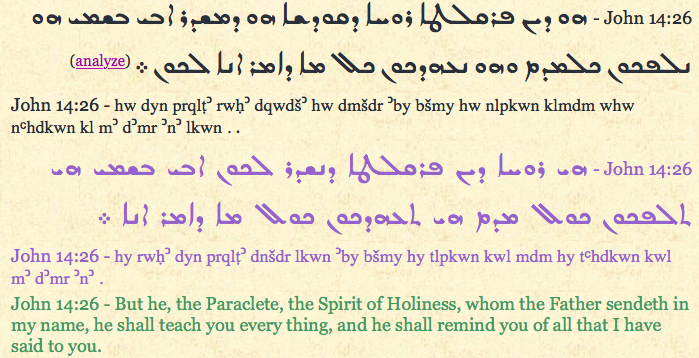

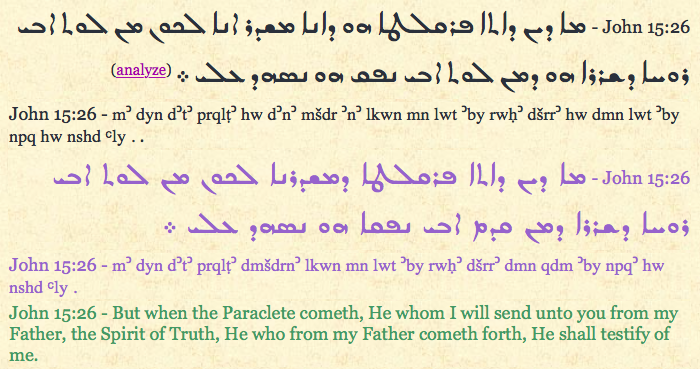






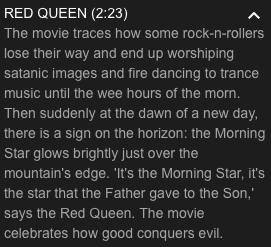
2 Comments